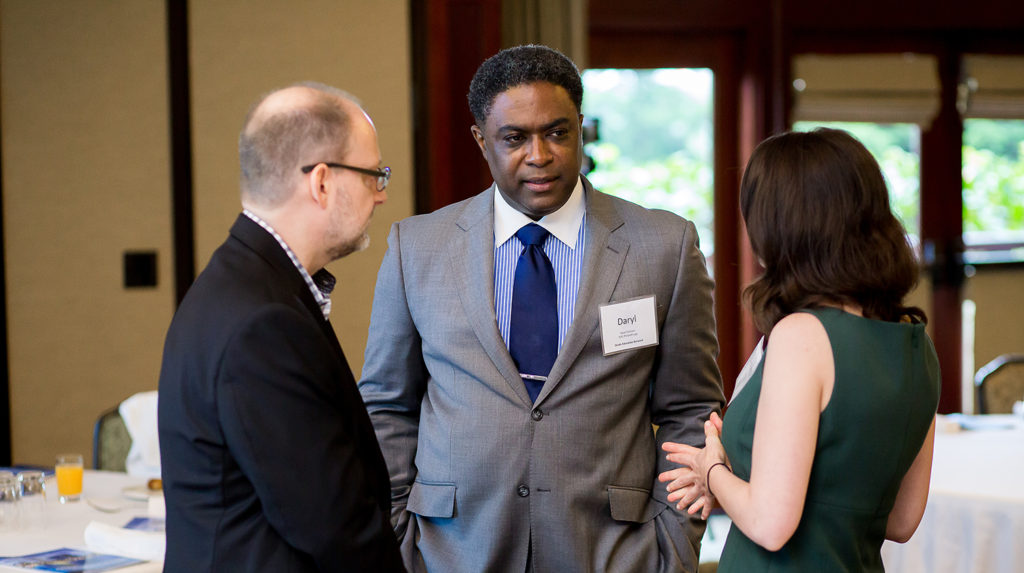Strategic Philanthropy and Reimagining Partnership: Igniting Initiatives to Promote Progress and Opportunity for HBCUs
The Strada Education Foundation’s Historically Black Colleges and Universities (HBCU) Initiative has been making headlines recently after achieving huge strides in key areas of student success. Since its launch in 2021, the program has continued to broaden its reach, build momentum, and equip students to succeed both on and off campus. Strategic philanthropy is the approach Strada has taken, and it has proven to be highly effective and impactful—not only to student retention, but to the lives of students.
By having a laser focus on factors like economic mobility, creating opportunities, coaching, and leadership development, Strada has found unique and inspiring pathways to achieve their goals.
In this deep dive conversation, Graham—himself a proud HBCU alum—shared his vision for fostering connections that drive student success, and how Strada has reimagined philanthropy and partnership. Along with Chief Product Officer at Mentor Collective, Erin Mayhood, Graham delved into the work he’s leading at Strada and opportunities other institutions can seize.
Watch the Full Event
Here are some key takeaways from the conversation.
Listen First ![]()
Strada’s success can be attributed to the power of listening. By embarking on a “listening tour” to visit multiple HBCUs across the country, Graham and his team were able to gain a true understanding of the needs of students.
“When you think about how philanthropy can function differently, starting with a listening tour,” said Graham, noting that Strada’s “listen first” approach allowed them to find solutions tailored to the unique needs of each institution.
Since its launch, the Strada HBCU initiative has expanded from 20 institutions to now include nearly half of all HBCUs. With such a large footprint, Graham stressed the importance of engaging with “not just handpicked institutions” but reaching out to all schools. Every HBCU is different, even ones in the same state.
“When you gain the insight from many stakeholders, not just a few; and you develop that partnership, you tend to develop solutions that answer questions and create opportunity for all,” said Graham.
The listening doesn’t end there. Through surveys, feedback loops, and multiple points of contact, Strada can continue to infuse the HBCU initiative with current insights that help students continue to move forward successfully.
Reimagined Philanthropy and Partnership ![]()
Partnerships are key to transforming the future of higher education. In order to succeed today, how institutions and stakeholders foster those relationships has to be reimagined. The less transactional the relationships are, the more depth can be brought to the partnerships. “To make a difference in this arena, we have to go beyond the surface,” said Graham, who emphasized the importance of going neck deep with fewer partners instead of going ankle deep with many, and how that approach enriches the programs and the student experience.
Partnerships also include alumni relationships, which have changed significantly. In the past, former students were a resource, now institutions are investing in strategic ways for alumni to play a specific role in helping with mentoring and coaching.
To graduate and successfully transition into a meaningful career and post-university life, students can’t get there on their own. Relationships, mentorship, and coaching are a big part of what today’s success looks like. Partnering with faculty, staff, mentors, stakeholders, and employers provides the support and resources that truly make a difference. 
Sense of Belonging and Trust Beyond Campus ![]()
What students need to progress and ultimately reach their goals doesn’t end in the classroom or at the gates of campus. Sense of belonging and trust aren’t just important within the structure of the university; they have to extend into the greater community. Successful programs must create experiences both on- and off-campus to help students feel connected and develop skills and mobility they can carry into the rest of their lives.
One initiative in particular focused on the student body improving relationships with law enforcement. “I’m Afraid for My Life” built bridges between students, civil leaders, and law enforcement. This doesn’t just make life better for students, but it ultimately improves the entire community, which in turn bolsters belonging, trust and student success.
Highlighting Affordability ![]()
Affordability and financial barriers have always had an impact on student engagement, progress, and success, and strategic philanthropy can be utilized to help bolster these areas. Through programs like scholarships, paid internships, and relationships with employers, financial barriers can be lowered or removed so learners can focus more on their educational experiences, which in turn improves retention.
“Paid internships are really motivating students to stay engaged in both work and studies, and it often leads to full-time opportunities,” said Graham. By helping students make in-roads into the workforce, they build their confidence, which in turn lends to their success.
Learn more about Strada Scholars
Impact Beyond the Numbers ![]()
Strada’s success is shown in the numbers: The year 1 cohort of 81 scholars had a 95 percent retention rate, with year 2 reaching 87 percent. Ninety percent of students have been able to secure paid internships, which goes a long way to ensuring their success. Beyond these tangible impacts, there are also plenty of inspiring personal stories of students progressing, thriving, developing, and reaching their goals.
Strada’s strategic philanthropy approach demonstrates that listening and keeping a keen eye on meaningful metrics can change the course of an initiative. By partnering alongside 50 HBCUs and adding value, the organization has been able to make an impact in areas like economic mobility, sense of belonging, trust, and leadership development, which ultimately drive student success in both quantitative and qualitative ways.
______________________________________
Mentor Collective uses its Fireside Chat channel to make transformative student success strategies and leadership accessible institutions around the country.